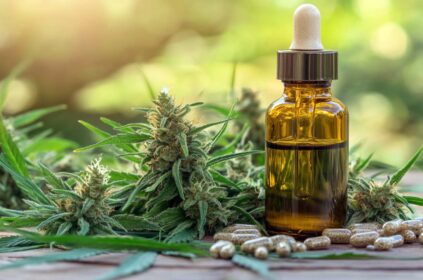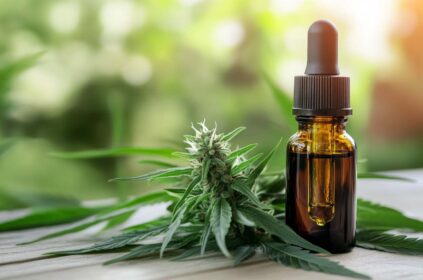Introduction
Psoriasis is more than just a skin ailment; it’s a chronic condition that impacts millions of lives, often taking a toll on both physical and emotional well-being. Characterized by red, scaly patches and itching, psoriasis can significantly diminish quality of life. Traditional treatments range from topical creams to systemic medications, but many individuals are exploring alternative therapies to ease their symptoms. Among these, CBD (cannabidiol), a prominent compound derived from the hemp plant, has garnered attention for its potential therapeutic benefits. This guide comprehensively examines how CBD may assist in treating psoriasis, along with its benefits, effectiveness, and important considerations.
Understanding Psoriasis
Psoriasis is an autoimmune disorder where the immune system mistakenly accelerates skin cell production, leading to the formation of inflamed plaques. These can occur anywhere on the body but are typically found on the elbows, knees, scalp, and lower back. It’s crucial to recognize that psoriasis is not merely a cosmetic issue; it can cause considerable discomfort, including itching and pain, and foster feelings of self-consciousness and emotional distress.
The impact of psoriasis extends beyond the skin. Studies indicate that individuals with psoriasis have a higher risk of developing related conditions such as arthritis, cardiovascular disease, and depression. This interconnectedness often necessitates a holistic approach to treatment, considering both the physical and emotional facets of living with psoriasis.
How CBD Works for Psoriasis
Anti-Inflammatory Properties
At the heart of CBD’s appeal in treating psoriasis lies its anti-inflammatory properties. Research suggests that CBD can help regulate inflammation by influencing cytokine production—the chemical messengers implicated in the inflammation associated with psoriasis. By reducing inflammatory responses, CBD has the potential to alleviate symptoms like redness, swelling, and discomfort.
Skin Hydration and Cell Growth Regulation
In addition to curbing inflammation, CBD is believed to improve skin hydration. Psoriasis often leads to dry, cracked skin, making hydration a key aspect of managing the condition. Some studies have shown that topical applications of CBD can enhance skin elasticity and provide moisture, thus addressing one of psoriasis’s most distressing symptoms.
Moreover, CBD may also play a role in regulating skin cell growth. By potentially slowing down the rapid skin cell production characteristic of psoriasis, CBD could assist in minimizing flare-ups and promoting healthier skin.
Topical Applications
Topical CBD products like lotions, creams, and balms are particularly promising for providing localized relief. When applied directly to affected areas, these products can deliver targeted effects, making them not only convenient but also effective. Dermatologists have noted that many patients experience significant relief from itching and inflammation when using topical CBD.
Case Studies and Research
Several studies point to the benefits of CBD in treating psoriasis. A notable study in Skin Appendage Disorders demonstrated that participants using a CBD-infused shampoo experienced considerable improvement in scalp psoriasis within a two-week window. In another study involving a CBD ointment over three months, participants reported enhanced skin hydration and overall quality of life improvements. Such findings lend credence to CBD’s potential within therapeutic contexts.
Effectiveness of CBD for Psoriasis
Symptom Management
CBD is lauded for its ability to manage various psoriasis symptoms effectively, including:
- Pain Relief: CBD has analgesic properties, potentially easing pain tied to psoriasis flare-ups.
- Reduced Itching: By addressing inflammation and providing moisture, CBD can mitigate persistent itching.
- Decreased Inflammation: CBD’s anti-inflammatory effects can directly tackle the inflammation driving the symptoms of psoriasis.
Real-life experiences echo the data. Dermatologists have observed notable improvements in patients utilizing CBD products, which often complement traditional therapies.
Risks and Considerations
Lack of Regulation
As appealing as CBD’s benefits may be, it’s essential to navigate the landscape with caution. The CBD industry remains largely unregulated, leading to a great deal of variability in product quality. Users should be aware that some products may contain levels of THC (the psychoactive component) or other ingredients that could be allergens or irritants.
Adverse Side Effects
While generally considered safe, CBD can cause side effects, especially when product ingredients vary. Some might experience skin irritation or allergic reactions to additives. Ensuring that products are sourced from reputable companies can help mitigate these risks. Always read labels for transparency regarding ingredient composition.
How to Use CBD Topicals for Psoriasis
Application Techniques
When considering CBD topicals, here are some practical tips for effective use:
- Direct Application: Apply the product directly onto affected areas. This localizes the treatment and enhances absorption.
- Dosage Advice: Depending on the product formulation, start with a modest amount—typically between 1-2 droppers if using an oil—or a small dollop of cream—adjusting as necessary based on personal experience.
- Allow Time for Absorption: Allow the product to penetrate the skin before dressing or layering on other topical treatments to ensure efficacy.
Choosing the Right Product
Selecting a high-quality CBD product requires careful consideration. Look for the following:
- Reputation: Choose brands with a transparent history and positive reviews.
- Ingredients: Ensure that products specify what type of CBD is used (e.g., full-spectrum, broad-spectrum, or isolate) and that they are free from harmful additives.
- Third-Party Testing: Opt for products that provide third-party lab test results confirming the purity and strength of the CBD content.
Conclusion
CBD has emerged as a promising player in the realm of managing psoriasis symptoms, boasting anti-inflammatory properties, hydration benefits, and potential regulation of skin cell growth. Its incorporation into treatment plans can offer relief for those grappling with the discomfort and emotional strain of psoriasis. However, the journey toward relief should be undertaken with informed decision-making—emphasizing quality products, awareness of potential risks, and seeking guidance from healthcare professionals.
Actionable Tips
- Consult Your Doctor: Always involve your healthcare provider before introducing new treatments for psoriasis.
- Select Quality Products: Look for CBD products that come from reputable sources and boast transparent ingredient lists.
- Monitor Your Response: Keep track of any changes in your symptoms and discuss these with your healthcare provider to gauge the efficacy and adjust treatment plans accordingly.
By equipping yourself with knowledge about CBD’s potential in managing psoriasis, you can take proactive steps towards alleviating this challenging condition, promoting not just skin health but overall well-being.




















